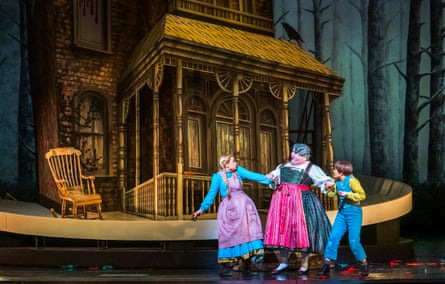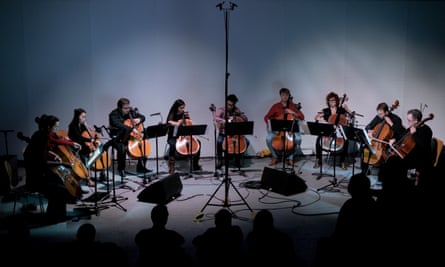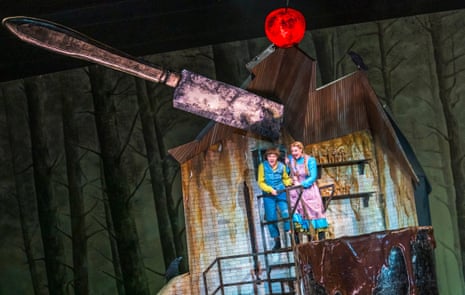A Psycho-gothic house you can guzzle, scuds of mist and glitter, and just enough video-nasty tics to rattle the nerves – no one can say the Royal Opera’s Hansel and Gretel isn’t fit for the season. Antony McDonald’s new production, which he has designed and directed, borrows from a traditional, Germanic fairyland and barely clouds the sweet woodland dream, even when the going gets heavy. Red Riding Hood, Snow White, Cinderella and Rumpelstiltskin – you’ll know them by their Disneyesque outfits – make an appearance. So, too, do foxy-wolfy animals on two legs and insects with iridescent wings. The sandman has a huge conk of a false nose. Gretel’s blond plaits are enviably long and fat.
Children may – reportedly and anecdotally do – love this new staging of Engelbert Humperdinck’s Christmas favourite. Announced as a family event, it might turn many young souls on to opera. (I should say I rebelled against it as a child – so lame, so sweet-toothed – and have never banished that early resistance.) The performance is sung in the original German. Presumably six-year-olds – the suitable starting age advertised by the ROH – are smarter than they were: the text is wordy and the surtitles move fast. Language policy is a bendy thing, and should be, but this decision feels perversely contorted. It’s particularly inexplicable given that the Royal Opera began the year with Monteverdi’s The Return of Ulysses in English, for an audience who would probably have expected, or preferred, the Italian.
The cast of Hansel and Gretel is charming, the singing engaging. Gerhard Siegel’s Witch, rubicund rather than grisly, has a nice, mock-horror physicality that flowers into full gruesomeness. The Polish mezzo-soprano Hanna Hipp delights as a comic and rubber-limbed Hansel. As Gretel, the Irish soprano Jennifer Davis, who stepped in as Elsa so impressively in the ROH’s Lohengrin in June, has shrunk her powerful voice just enough to sound light and girlish. Sebastian Weigle, making his house debut, conducts with assurance, but the music remained four-square. The Wagnerian layers and idioms of Hansel and Gretel, undeniably present, are often given as a defence of its quality (“but it’s so Wagnerian”) – a strange kind of praise akin to advocating herring roe because it’s very slightly like caviar.

As the troubled, depressive mother, Michaela Schuster shines, at once neglectful and desperate. Eddie Wade makes a jolly, drunken father, a sterling late replacement who even manages to juggle three eggs. How one parent knows there’s a famous, monstrous, child-abducting witch living nearby and the other has no idea, letting her children roam freely in the woods, can only be a mark of their dysfunctional relationship. Alternatively, it’s a clumsy plot device in a libretto full of them. To date, only Richard Jones’s hideous, kinky version for Welsh National Opera has convinced me of this work’s status as a masterpiece. Many revere it. So might you. Find a non-cussed child and take it.
Just as the year sinks into its soft, candied-peel-and-spice dying days, along comes the London contemporary music festival to waken the senses like a smack of birch twigs. LCMF’s early years were a movable feast, in date and venue. Now it’s a mid-December fixture, taking place chiefly in Ambika P3, the former concrete construction hall deep beneath Westminster University. This year’s festival boasted a profusion of events ranging from a Death of Rave all-nighter to the world premiere of Gerald Barry’s wonderfully belching and eruptive The Destruction of Sodom (2015), for an army of horns and two wind machines. Now in its stride, the festival has its own LCMF orchestra, conducted by Jack Sheen, and has commissioned several new works.
The 2018 theme was Sounds of the Thick Present, not a reference to current politics but a quote from the American philosopher Donna Haraway (see her book Staying with the Trouble: Making Kin in the Chthulucene). Mercifully its meaning was precis-ed in the programme as chipping and shredding and composting time as well as ideas.

Elaine Mitchener’s breadthbreath (2018, world premiere LCMF commission) had an improvisatory mystery, arriving and departing slowly and delicately. Apartment House, consisting of 10 cellos, and the experimental singer Sofia Jernberg, gave the UK premiere of Julius Eastman’s The Prelude and Holy Presence of Joan d’Arc (1981), expressive and touching. A highlight of the evening was Annea Lockwood’s tiny Gone! (2007): a wind-up toy piano, tethered to a large bunch of helium balloons, jingles ethereally in the cavernous subterranean space. It almost felt festive.
Star ratings (out of five)
Hansel and Gretel ★★★
LCMF ★★★★
Hansel and Gretel is in rep at the Royal Opera House, London, until 29 December

Comments (…)
Sign in or create your Guardian account to join the discussion